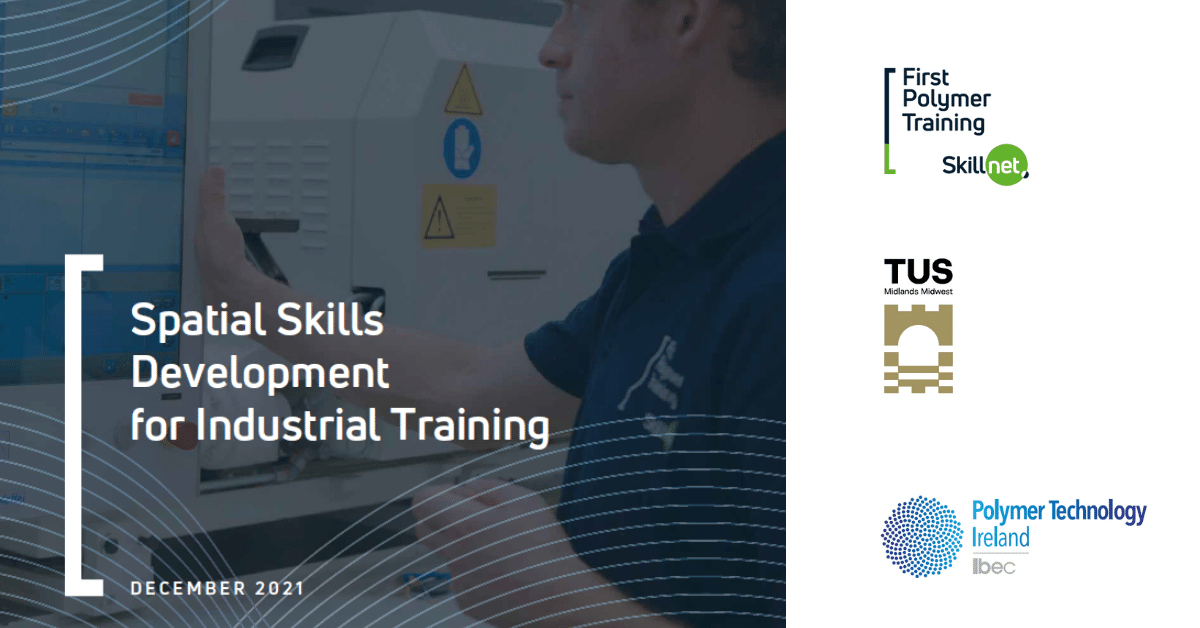First Polymer Training (FPT) Skillnet launched their ‘Research Report in Spatial Skills Development for Industrial Training’ recently. The study was a collaboration between FPT Skillnet, Technological University of the Shannon: Midlands Midwest (TUS Midlands) and their member companies, supported by Skillnet Ireland through our funded research projects.
“Gaining insights into innovative learning methods is a vital part of our talent development agenda with SMEs. This new research from First Polymer Training Skillnet further supports our work in this area.” Skillnet Ireland Executive Director, Dave Flynn
To learn more about the role that spatial skills training can play in increasing the effectiveness, efficiency and experiential value of training interventions in the polymer industry we spoke with Catherine Collins, Network Manager, FPT Skillnet about the key observations and recommendations of the research report.
Spatial skills for the polymer sector
Spatial ability is the capacity to perceive complex patterns and mentally simulate how they might look when rotated, inverted and so on. Research to date suggests that spatial ability is an important predictor of achievement in STEM. FPT Skillnet has always taken a progressive and innovative view of new ways of learning to enhance the user experience of their programmes. Catherine explained that while the team had an awareness of the benefits of spatial skills in engineering and in everyday life, they were not aware of its proven impact on performance across a range of technical disciplines. Their research partners at TUS (Midlands), have a wealth of experience in engineering education through their work in the Technology Education Research Group (TERG) and internationally in their research on spatial skills.
Previous international results from spatial skills training interventions showed a very positive impact on a wide range of STEM skills and on retention of participants on technical third level programmes. One of the most interesting facts for Catherine and the team at FPT Skillnet was that spatial skills can be ‘trained’, so even good spatial skills can be further enhanced, and poorer spatial skills can be improved.
“It was very exciting to engage with leading experts in engineering education and research, to explore the potential benefits and application of spatial skills training to industry. The study highlighted the potential to develop a revised intervention for industry participants and how the existing intervention could be applied in other relevant contexts.” Catherine Collins, Network Manager, First Polymer Training Skillnet
Like many sectors, the polymer sector is experiencing skills shortages and FPT Skillnet is focused on retaining as many people as possible that have enrolled on their sector specific programmes. Catherine found the main reason people dropped out of their third level technical programmes was that they found STEM subjects like Maths and CAD (Computer-Aided Design) very difficult, hence the interest in the potential of spatial skills training.
Previous research published in the US had also shown spatial skills training had improved female participation levels in STEM subjects. Catherine points out that as on average just 6% of FPT Skillnet’s technical trainees are female, this could potentially help attract more female technicians and engineers into the sector. There was no statistical significance in the study findings in relation to the intervention leading to improved spatial skills however the post-test scores were good, and it appears to have been more impactful for people with initially very weak spatial skills. The qualitative feedback from the one-to-one interviews conducted proved very useful for future work in exploring what a revised intervention for industry employees might look like.
The benefits of developing spatial skills
Developing spatial skills has a beneficial role to play in STEM-related career development and progression and should be incorporated in undergraduate engineering education programmes. Where industry-led programmes cater for school leavers, spatial skills development should form part of these programmes.
Looking to the future, the report recommends investigating the following:
- Could a purpose designed spatial skills training intervention for engineering employees identify an area of utility for these participants.
- If a less demanding low risk training intervention could be a useful preparatory prelude to future online industrial training programmes.
- Explore the benefits of spatial skills training for school leavers undertaking apprenticeship and internship based educational/training programmes.
“This research project gave valuable and unique insights into the area of spatial skills in engineering, where the benefits of developing these skills for engineering students have been analysed in higher educational settings but have never been investigated within an industrial training context. As a result, the findings from this investigative study have highlighted some key issues and paved the way for further important and exciting research”. Rónán Dunbar, Lecturer and Engineering Education Researcher, Technological University of the Shannon: Midlands Midwest (TUS)
Learn more
Read the full report and visit the FPT Skillnet website to learn more about the upskilling and development opportunities they offer. Keep up to date with their latest news on Twitter, Facebook and LinkedIn.
Stay connected with Skillnet Ireland
Receive regular news and insights from the world of talent development straight to your inbox.
By adding my email, I agree to the use of my personal data in accordance with Skillnet Ireland Privacy Policy.



